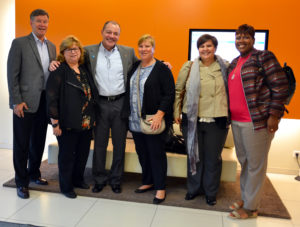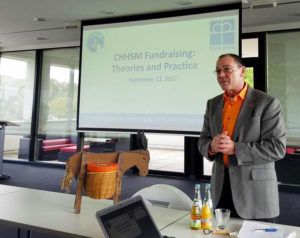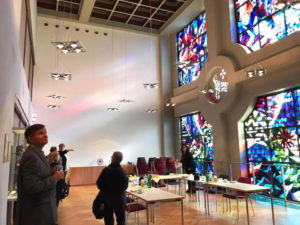United Church of Christ and German Partners find Common Ground in Health and Human Services

The CHHSM delegation arrives in Düsseldorf.
Representatives of two completely different systems of service in health and human service ministries came together for a week in Germany, exchanged ideas, and left inspired for the future.
A seven-member delegation from the United Church of Christ’s Council for Health and Human Service Ministries met Sept. 6-13, 2017, with representatives from Diakonie Rheinland-Westfalen-Lippe (RWL), the health and human services arm of the Evangelical Church in Germany.
“We gained a deep understanding for the nature of their health care system,” said Michael J. Readinger, president and CEO of CHHSM. “In both U.S. and German systems, the challenge is maintaining our faith-based presence, and the meetings helped both groups explore ways of doing that.”
The September gathering was the latest meeting of the partnership. In 2013, German delegates came to the United States, and in 2009, the CHHSM delegates visited Germany. During the various sessions of this trip, UCC representatives learned about the differences between German and U.S. systems.
Servant leadership in different systems
In Germany, “the Diakonie is defined as being a part of the church because ‘they spread the word of the gospel and they serve a holy meal,’” said Readinger, quoting the definition of diakonia. “There is a distinct and serious relationship between Diakonie RWL and the political structures, and it is codified by law.”
For example, he said, a small percentage of Diakonie RWL’s funding comes from a “church tax” that baptized German workers pay. The rest comes from the country’s social welfare system. Despite the different types of funding sources, social services are unreimbursed at about 15 percent, which is similar to U.S. health and human service agencies.

MIchael Readinger explains CHHSM fundraising best practices to representatives of DIakonie RWL.
In an ironic parallel to current U.S. struggles over health care coverage, two German political parties are pushing to privatize health and social services and move away from the current health care funding structure. The similarities led to a three-hour presentation by the UCC delegation on fundraising strategies.
“Our education session on fundraising was very informative to both groups,” Readinger said. “The German system of reimbursement is changing, and they will need to do more and more fundraising from corporations, foundations, churches, and individuals in the near future.”
One of the most discussed topics during the trip was providing assistance to refugees. The UCC delegation learned that Diakonie RWL views ministering to refugees “as an important and increasing call to serve those in need,” said Readinger. “Their programs for advocacy, counseling, financial and workforce support are an incredible example for our CHHSM ministries and our government.”
Representatives from Diakonie RWL saw a connection between the UCC’s advocacy work and their own. The UCC “sees itself as a fighter against poverty, social injustice and prejudice,” Diakonie RWL summarized in a follow-up news story. “[CHHSM] has a clear vision and mission.”
Visit enlightening, heartening

The windows of Adolphi-Stiftung in Essen, a senior living community that was built in an old church.
During its time in Germany, the UCC delegation toured several Diakonie RWL communities, including Graf Recke Stiftung in Düsseldorf, an organization that works with youth, and Adolphi-Stiftung in Essen, a senior living community that was built in an old church.
“I witnessed God at work in many ways,” said delegate Mary Paxton, director of the UCC’s Office of Philanthropy and Stewardship. “I truly thank the UCC and CHHSM for this opportunity.”
By the end of the visit, both groups had shared the individual struggles each face, as well as their hopes and dreams.
“For the future,” said Readinger, “we will look to continue and strengthen our relationship with Diakonie RWL. We have much to share with them and learn from them.”
In particular, the U.S. delegation found that the common focus on “the why” — the service — gives hope for future work.
“This was my third visit to Diakonie RWL,” said the Rev. Danielle Bartz, CHHSM’s associate for leadership and advocacy. “What always strikes me is the similarity to the work of our CHHSM members, and the passion of the servant leaders doing that work.”
On that point, Diakonie RWL agrees. “In addition to the good networking and the professional fundraising [discussion], I was particularly affected by the high identification of the delegation with their work,” said Helga Siemens-Weibring, social policy deputy of Diakonie RWL. “What they do, they do on the basis of their Christian faith.”
“We look for new ways to continue our relationship,” reflected Daniel, “sharing best practices, learning innovative approaches, and developing faithful leaders for the next generation.”
In addition to CHHSM staffers Readinger and Bartz, CHHSM delegates to Germany included the Rev. Ken Daniel, president and CEO, United Church Homes, based in Marion, Ohio; the Rev. Barbara Kershner Daniel, senior pastor of Evangelical UCC in Frederick, Md.; Danette McCarns, executive director of Peppermint Ridge in Corona, Calif.; the Rev. Bonnie Condon, vice president of faith outreach, Advocate Health Care in Chicago; and Mary Paxton, director of the UCC’s Office of Philanthropy and Stewardship. Diakonie RWL will visit the United States in February and March 2018, touring many CHHSM sites and attending its annual meeting.
Join Our Mailing LIst
"*" indicates required fields
Follow on Facebook
New Resident Finds Belonging at Emmaus Homes - CHHSM
www.chhsm.org
Heather’s journey toward independence has been nothing short of inspiring. Since moving into her new home last year, Heather’s world has expanded in ways she never imagined. Leaving the familiarit...